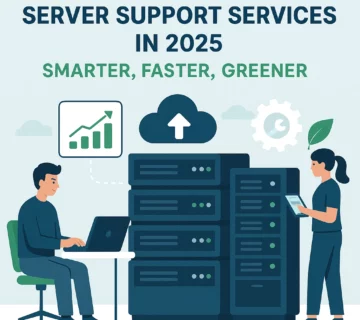The Latest Trends in Server Support: What Businesses Need to Know in 2025

As technology advances at lightening speeds, businesses are increasingly reliant on efficient server systems to power their activities. From data handling and application hosting to cloud integration, servers support the foundations of the modern IT system. In line with this dependency comes the growth role of server support, not only to ensure uptime but also security, scalability, and performance. In this blog, we’ll dive into the latest trends shaping the world of server support, highlighting why organizations need to stay ahead and how leveraging professional server support services can make all the difference.
Hybrid and Cloud-First Server Environments
One of the most significant shifts in recent years is the move towards multi-cloud and hybrid environments. Companies are no longer operating with only on-premise servers; instead, they are combining cloud and physical servers to achieve optimum flexibility and affordability. Hybrid setups allow organizations to keep sensitive data on private servers while taking advantage of cloud services for remote access and scalability. Not only does this increase agility, but it also removes single points of failure risks. However, such environments require niche skills to administer. That’s where server supports step in delivering integration of cloud and on-premise environments, overseeing performance monitoring, and debugging problems caused by conflicts across different server environments.
Increasing Importance of Cybersecurity in Server Support
The complexity of cyber attacks has made security a major concern in server administration today. Servers are frequent targets of ransomware, phishing, and denial-of-service (DDoS) attacks. Modern server support goes beyond simple monitoring—it involves proactive patching, real-time intrusion detection, and strict compliance (such as GDPR, HIPAA, or PCI DSS). AI-driven monitoring tools are now being used to anticipate and prevent potential breaches from occurring in the first place. By utilizing server support services, organizations have at their disposal teams that are not just reactive, but also proactive, taking firm defense actions and making servers robust to evolving cyber threats on a continuous basis.
Automation and AI in Server Monitoring
The days are gone when server monitoring used to be a manual process. Artificial intelligence (AI) and machine learning are transforming server support by automating performance monitoring, anomaly detection, and predictive maintenance. Automation tools also have the ability to predict potential bottlenecks or failures even before they cause downtime. AI-driven predictive analytics allows IT teams to plan capacity upgrades or patches in advance. Server support that leverage these technologies can significantly reduce operational costs while maximizing uptime. Instead of putting out fires, businesses can focus on strategic projects while their servers are in top condition.
Edge Computing and Server Distribution
The expansion of the Internet of Things (IoT) and real-time data processing has been fueling the need for edge computing. Instead of relying on centralized servers only, organizations are moving closer to the data source, adopting distributed server nodes for faster response times. For instance, industries like healthcare, manufacturing, and autonomous vehicles depend on edge servers for real-time data processing. However, this decentralized approach introduces additional complexities in server management. Professional server support services help businesses keep distributed infrastructure in shape by making regular updates, monitoring performance across numerous nodes, and defending against vulnerabilities in remote offices.
Sustainability and Green Server Support
Sustainability has become a top priority for business organizations all over the world. Servers consume huge amounts of energy, and inefficient server management can translate into not just cost but also environmental impact. Data centers are now adopting energy-efficient cooling systems, virtualization, and renewable energy sources. Companies are also focusing on the reduction of hardware footprints through virtualization and cloud migration. Through the assistance of server support, organizations can implement green approaches with zero loss in performance. Professionals can consolidate server workloads, reduce power consumption, and align IT operations to corporate sustainability goals.
24/7 Support and Remote Work Expectations
Remote and hybrid workforces have permanently changed how companies approach server reliability. Company resources are now expected to be available to employees regardless of time or place. This shift raises expectations for on-call server support around the clock. Business downtime in one location could impact employees or customers halfway across the globe. Present server support services offer immediate monitoring, prompt incident resolution, and minimal downtime, keeping operations running globally in today’s dispersed work environment.
Industry-Specific Compliance Requirements
As data privacy laws become more robust internationally, server support must be compliant with industry-specific compliance requirements. Healthcare organizations need HIPAA compliance, banks and other financial institutions demand strong SEC and PCI DSS regulations, and international companies must be compliant with GDPR standards. Non-compliance can lead to significant fines, loss of reputation, as well as business disruption. This is why businesses rely heavily on server support solutions that understand compliance models well, such that servers are both secure and compliance-capable.
Customized and Scalable Support Models
Those generic server support days are gone. Now, businesses anticipate customized solutions that suit their individual needs. From small businesses with minimal needs to large companies managing global infrastructures, server support must be scalable and flexible. Leading providers are offering tiered levels of service, allowing businesses to choose exactly how much support they require. From basic monitoring right up to complete management, these custom solutions offer affordability without sacrificing reliability.
Final Thoughts
The world of server support is accelerating at lightning speed, powered by emerging growth domains like AI, cloud computing, security, and sustainability. For business, staying ahead means realizing that server management is more than just a back-office function it’s critical to operational success. Investing in expert server support services not only assures performance and uptime but also conformity, security, and long-term scalability. Early technology adopters will gain a competitive edge as technology evolves, while late adopters will be left behind. Server support in 2025 and beyond is more than upkeep it’s enabling innovation, safeguarding operations, and advancing the future of digital business.


No comment